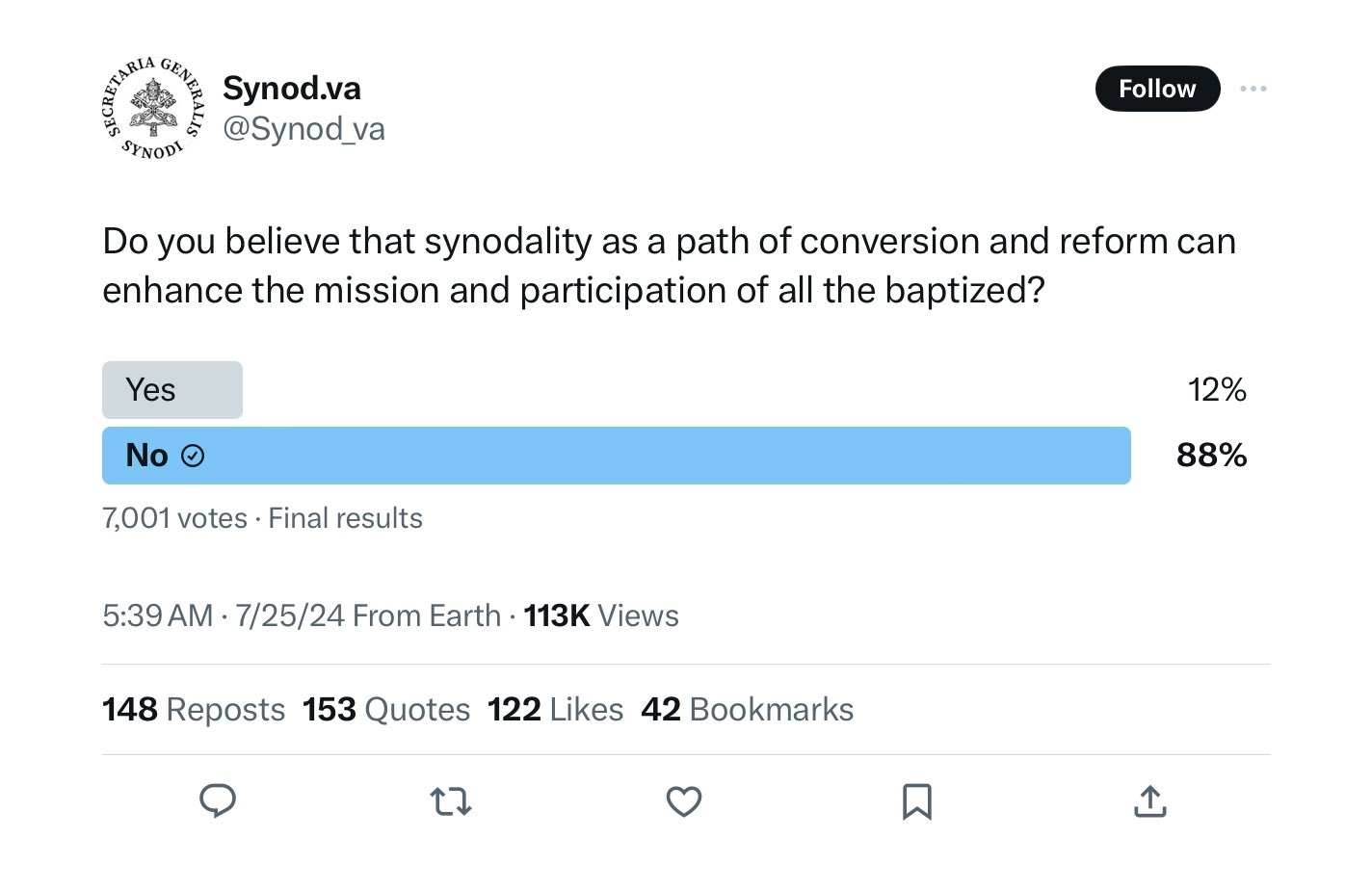|
Getting your Trinity Audio player ready...
|
Last month a social media intern working for the General Secretariat of the Synod posted a poll on 𝕏 (formerly Twitter). The yes/no poll asked: “Do you believe that synodality as a path of conversion and reform can enhance the mission and participation of all the baptized?”
One can imagine the thought process of this young intern. He (or she) is surrounded by people obsessed with All Things Synod. These people have been living and breathing the Synod on Synodality for years, and likely believe it is revolutionary in the life of the Church. If this poll were taken in the Secretariat’s offices, I’m sure the “Yes” votes would have approached 100% of the total. I’m sure this poor intern was expecting similar enthusiasm from the common folk.
So what was the result on 𝕏, when actual Catholics in the real world were asked? Not so rosy.
Orthodox. Faithful. Free.
Sign up to get Crisis articles delivered to your inbox daily

Out of 7,001 votes, the “No” votes accumulated an astounding 88% of the total. Many of the replies to the poll included pithy remarks such as “Please preach the Gospel” and “We just want the TLM.” The response was so embarrassing to the Synod that it deleted the poll.
The irony just oozes out of this overwhelmingly negative response. Synodality, after all, purports to be based on the idea that the Church should listen to the people, to respond to their hopes and desires. The Church need no longer be run in a top-down fashion, we are told. Power to the people!
Yet when the people spoke, the Synod officials shut them down because what the people said didn’t go along with what they wanted to hear. I guess it’s not really a people-driven movement after all.
Calls for “Synodality” in the Church are similar to recent calls for “Democracy” among progressives in America. The Left warns that democracy will be over if someone it doesn’t like is democratically elected, and is so concerned with protecting democracy that it will circumvent democratic processes and have its power brokers anoint a candidate behind closed doors. Then Democracy can be saved.
When Vatican officials speak of synodality they mean the same thing Democrats mean when they speak of democracy: rule by a progressive elite with a populist veneer. When Vatican officials speak of synodality they mean the same thing Democrats mean when they speak of democracy: rule by a progressive elite with a populist veneer.Tweet This
This is why we have this weird focus on synodality, which is essentially just a bureaucratic process. And it is weird: recently a prominent Argentine theologian commented, “It is not enough to have a synod, it is necessary to become a synod.” What?!?
Church leaders promote synodality as the cure for all that ails the Church because synodality is a cover.
What is really going on is that progressive factions in the Church failed to implement what they want. What do they want? Just look at what the Anglican church has done for the past century for your answer: official acceptance of contraception, married priests, women priests, looking the other way at divorce, an embrace of homosexuality, and other, mostly pelvic-related, demands.
Progressives are smart enough to know that simply declaring these teachings reversed from on high won’t work; there’s too much history behind the traditional teachings. Perhaps too they see how the Anglican church has fallen apart by doing that. So these progressives need a faux process to garner support among the laity and make them think it was all their own idea: synodality!
Fortunately, the laity are having nothing to do with it. Their concerns are far more real: raising their kids Catholic, attending a reverent Mass, hearing the full Gospel proclaimed from the pulpit, receiving help to bring their fallen-away loved ones back to the Church. This is what matters to them, not making adjustments to how the Church bureaucracy works.
This push for synodality isn’t brand new, either. Church officials have been trying it since the close of Vatican II. The progressives saw that the Council itself didn’t give them everything they wanted, so they created an official process to implement the “Spirit of Vatican II.” Thus, the modern synod process—synodality—was born.
Germany saw one such synod launched in the early 1970’s. The Würzburg Synod (1971-1975) held debates on the same issues we hear about today from the Catholic Left: celibacy, permission for the divorced-and-remarried to receive Communion, women deacons, etc. This synod was touted as a process for both clergy and laity to gather together to shape the future of the Church. Supporters praised this progressive methodology as a new way to move forward.
One prominent priest in Germany at the time wanted no part of it, however. His name was Fr. Joseph Ratzinger. He wrote:
“People complain that the great majority of the faithful generally show too little interest in the activities of the synod, [but] to me this caution looks more like a sign of health.”
Ratzinger continues:
“[The faithful] don’t want to go on hearing more about how bishops, priests, and high-ranking Catholics do their jobs, but what God wants from them in life and death and what he does not want.“1
The future Pope Benedict XVI hit the nail on the head. Catholics in the pews instinctively distrust the synod process because they sense it is a cover for injecting progressive poisons into the Church’s bloodstream. Synodality isn’t a process in which the laity’s concerns are heard; it is a process by which they are ignored.
So, as yet another session of the interminable Synod on Synodality approaches in October, faithful Catholics should do what the hierarchy is doing to you: ignore it. Just ignore the bureaucrats who love to hear themselves talk. The round tables at which they sit perfectly represent the insular, detached from the outside world, nature of these discussions. Ignoring them is the best bet, as there’s no magisterial authority in these synods, and there’s nothing coming out of them that’s helpful for actually living out the faith in the modern world.
Yes, some Catholics will need to point out the errors of the Synod (be assured we’ll do that here at Crisis) in order to inform any confused Catholics about why it should be ignored, but for most Catholics, the best advice I can give is to simply sit this one out. We saw from that 𝕏 poll that Church officials don’t actually want to hear from you, so make sure the feeling is mutual. Instead of getting caught in the synodality mire, Catholics can focus on living the Faith in their families and parishes, sharing it with others, praying often, receiving the Sacraments, and as Fr. Ratzinger said, learning “what God wants from them in life and death and what he does not want.”

Great article, thanks. Synodality was exposed as a means of manipulating the faithful when they deleted their own survey of “the people” because the results weren’t favorable to their desired outcomes. Sadly, I don’t think anyone will learn from the public reaction, but instead will explain it away as being the response of “backwardists”.